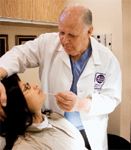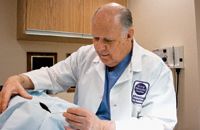- Acne
- Actinic Keratosis
- Aesthetics
- Alopecia
- Atopic Dermatitis
- Buy-and-Bill
- COVID-19
- Case-Based Roundtable
- Chronic Hand Eczema
- Chronic Spontaneous Urticaria
- Drug Watch
- Eczema
- General Dermatology
- Hidradenitis Suppurativa
- Melasma
- NP and PA
- Pediatric Dermatology
- Pigmentary Disorders
- Practice Management
- Precision Medicine and Biologics
- Prurigo Nodularis
- Psoriasis
- Psoriatic Arthritis
- Rare Disease
- Rosacea
- Skin Cancer
- Vitiligo
- Wound Care
Article
High-energy leader: Founder of Skin Cancer Foundation devotes life to teaching, helping others
Author(s):
The morning of his interview with Dermatology Times, Perry Robins, M.D., had just flown in from a domestic dermatology meeting, lectured two weeks prior at a major dermatology meeting in Florida, and flown overseas a month before to lecture at a meeting in Paris.

The 78-year-old - who performs more than 1,000 surgical procedures annually and conducts dermatologic surgery workshops - had also attended six weddings during the previous two months.
Dr. Robins, professor of dermatology emeritus and chief of the Mohs Micrographic Surgery Unit at New York University Medical Center, founded about a dozen organizations, including the Skin Cancer Foundation, International Society of Dermatologic Surgery and American College of Mohs Micrographic Surgery.

Helping out
Dr. Robins' high energy level and unrelenting devotion to making a difference are family traits, he says.
"I grew up at the end of the Depression. I had family members that were very philanthropic in what they were doing. They led me, in the early days, to believe that it is wonderful to be able to help people," Dr. Robins says.
"I have been able to carry that out throughout my life," he says.
Ester Robins, Dr. Robins' mother, was secretary of a women's organization.
"The principal at my grammar school called her and said, 'Mrs. Robins, we have two children that came to school in paper shoes and it is snowing. Would your organization be able to buy some shoes?' My mother said, 'I do not know about the organization, but I will.'"
Dr. Robins learned only after his mother's death that she would help whenever the principal called, without saying a word to anyone.
Mrs. Robin's example made her son a fighter for what he believes.
"I believe in things and use all my energy to bring them to fruition," Dr. Robins says.
Pegged for medicine
Dr. Robins got his first taste of medicine when he served in the Army and was assigned to work in a pediatric clinic at a Tokyo Army hospital.
The physician there noticed Dr. Robins' enthusiasm for helping children, and the doctor told the young enlisted man that he would "haunt him for the rest of his life" if he did not pursue medicine.
Skilled surgeon, teacher
When Dr. Robins completed his dermatology training, he met with a doctor in Madison, Wis., named Frederick Mohs, M.D.
"Dr. Mohs was doing a procedure called 'chemosurgery' (today, Mohs surgery). I found out that I could learn a procedure and help and cure patients, where other doctors of all different specialties had been unsuccessful," Dr. Robins tells Dermatology Times.
"I found out that this technique was very special. Not only did I want to do it, but I wanted to teach it to others," he says.
Dr. Robins returned to New York University Medical Center, where he has taught for 43 years, and spearheaded the first chemosurgery unit in the eastern United States.
Newsletter
Like what you’re reading? Subscribe to Dermatology Times for weekly updates on therapies, innovations, and real-world practice tips.











